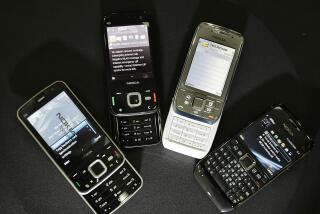Smart but Worrisome
- Share via
It has come to this: Engineers across the world have toiled to make Buck Rogers’ dreams a reality, developing sophisticated satellites and launching them into precise geosynchronous orbits, all so a 15-year-old girl in the mall can use her cellphone to tell her when that boy who text-messaged her earlier is within 100 yards.
Well, progress is progress. Most of us may not have realized there was a pressing need for cellphones that can consult global positioning satellites and beep us when certain people are nearby, but these marvels are at our doorstep anyway. Companies you probably never heard of, such as Dodgeball, have begun Internet campaigns -- pitched mostly at teenagers -- to tout such services in U.S. markets.
New technologies, especially those aimed at kids, tend to arouse anxieties. That was true of Pogo sticks and video games, and it’s sure to happen again with “smart cellphones,” personal digital assistants that can also function as cameras, address books and MP3 players. The most immediate danger is that, like any wireless technology, they can be accessed by hackers. This was demonstrated sensationally last month when someone figured out the access codes to reality TV star Paris Hilton’s cellphone account. The home phone numbers of her friends and even a few of her nude photos spread quickly through the Internet.
Unfortunately, the threat posed by the new phones goes beyond electronic bugs.
What if that “boy” who text-messaged the girl was really a 50-year-old predator? And wouldn’t kids be likely to use the vicinity detector so they could tell when their parents were heading home, giving them time to hide the evidence?
Science fiction movies may have amplified many parents’ sense that technology is some unstoppable juggernaut beyond their control, but even if smart cellphones pose some real dangers, they can also boost parental power. For instance, uLocate Communications offers a service on Nextel phones that lets parents track their children’s whereabouts using cellphones or PCs.
The cellphone industry’s goal now should be to avoid doing what the PC industry did four years ago. When worms and viruses sent through the Internet began crippling personal and office computers, the PC industry was sluggish in its response, prompting Congress members to propose ham-handed legislation that ultimately failed to win approval.
Rather than waiting for Congress to go after them, cellphone providers should do a better job of alerting parents to the potential dangers and place a high priority on finding technological solutions to security lapses.






